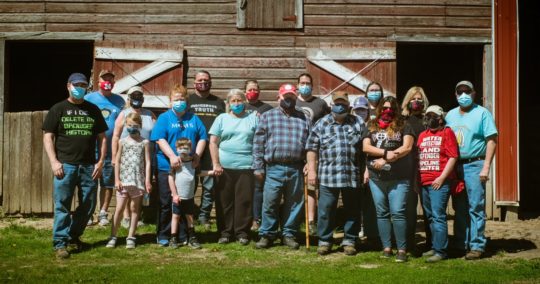We were absolutely floored by the powerful testimony in support of the pipeline bills at Wednesday’s hearing. We’ll say it again: thank you so much to all of you who have signed our petition, written letters, put bumper stickers on your car, called elected leaders or stuck a sign in your yard. These bills would not exist if not for you.
We know many of you could not make it to the hearing because of work or family, but we know you were there in spirit. Of course, just because you couldn’t be there doesn’t mean you should be left out of the experience. So we compiled a few of the highlights we saw during the 6.5 hour hearing.
If you want to read all the testimony Bold Nebraska collected and submitted from folks who could not attend, click here.
Before we get to the highlights, you need to know that this hearing was just the start. We have an update on how you can take action to keep moving this legislation forward at the bottom of this post.


Expert Testimony:
The hearing opened with neutral testimony from experts that the Natural Resources Committee requested to appear. We wanted to cheer when Wayne Woldt, a water expert from UNL, said there’s a real chance tar sands oil would sink in water, not float. Of course, Sen. Christensen sits on the committee (although he left the room for a good portion od hearing), and he recently told a reporter that he wasn’t worried about the pipeline because oil floats. See what happens when you don’t do your homework, kids?
Dave Wedin, an ecosystem ecologist from UNL whose expertise is the Sandhills, then testified about how difficult it is to restore the landscape once you have a blowout. It’s incredibly difficult to stabilize the sand, and the landscape becomes incredibly flammable when there’s no green grass. He concluded saying local, volunteer fire departments wouldn’t be able to handle an oil fire.
That claim is back up by Plains Justice report on TransCanada’s inadequate emergency response plan. While they don’t have polar bears in theirs (remember BP), TransCanada has a major lack of basic planning in place for rural states.
Landowner Rockstars:
You’d have to have a heart of stone or being getting major moolah from TransCanada not to be moved by the testimony from landowners in the Sandhills. They talked about their deep roots to the land and the awful treatment they’ve received from TransCanada. One rancher spoke about how frustrating it was that her son was about to be shipped out to Afghanistan to defend our country, but her state government can’t protect her from a foreign company.
Whether or not you think the pipeline should be built, landowners have a basic right to be protected by our government. Right now, Nebraska isn’t doing that.
TransCanada Packs the Bench:
We lost track of how many TransCanada representatives testified. What’s worse, they didn’t seem to abate too many fears. TransCanada’s environmental reclamation expert, Mike Schmaltz, said they could dig up a dune and rebuild the landscape exactly as it was before their construction. Senator Haar got so mad we thought he was going to whip his hula hoop (no joke, he brought one to show the size and thickness of the pipeline) across the table at the guy.
Schmaltz compared Nebraska’s landscape to dunes in California. Never mind that we have far more wind and water than the West Coast. When asked if landowners had a say in the reclamation of their land, he shrugged and replied, “They can.” If TransCanada didn’t raise concerns about their naivete of the Nebraska landscape before Wednesday night, they have now.
Jobs, Jobs, Jobs:
One of the big talking points from the opposition was jobs. There seems to be some fear that by giving Nebraskans more control via state pipeline regulations, we’ll lose jobs. But the bill sponsors repeatedly emphasized that their goal was not to stop the pipeline but to protect Nebraska resources and fellow Nebraskans with a baseline of local control and local regulations. This did not stop TransCanada from trying their best though to push the talking point that their project “brings jobs.”
A union rep said TransCanada had suggested the pipeline would create 250 construction jobs in Nebraska and that 100% of those would go to Nebraskans. Those are very different numbers from the 500 jobs, 80% of which would go to Nebraskans, that THE SAME UNION told the World-Herald last week. And those are very different from the numbers TransCanada’s rep gave us over the summer (that’d be 1,000 with 10-15% going to Nebraskans).
The Department of State ran job numbers on the last pipeline project and Nebraskans got 12% of the jobs, resulting in about 94 jobs out of 1,200 that came to our state. The fact is, no Nebraskan, union worker or landowner, can trust TransCanada’s job numbers. These short-term jobs are not worth the long-term risk of the pipeline.
ACTION:
Now that the hearing’s over, we need to put pressure on every member of the Natural Resources Committee to “vote yes” and move the bill out to the Legislature’s floor for a full vote. Click here for a list of every members’ phone number and email address as well as a sample letter. Tell them to “vote yes” on all three “pipeline bills” LB340, LB578 & LB629. If you have any problems or questions, email us at info@boldnebraska.org.



